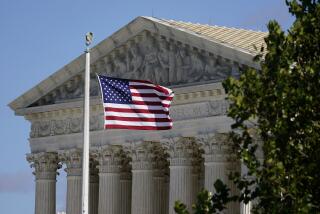Justices Will Also Decide Banking, IRS Issues : High Court to Hear Stock Tip Case
WASHINGTON â The Supreme Court agreed Monday to decide whether investors duped by allegedly illegal stock tips may sue those who gave them the inside information.
The justices also agreed to decide whether states may play favorites in choosing which out-of-state bank holding companies will be allowed to take over in-state banks.
And in another ruling related to banking, the court agreed to decide what power the Internal Revenue Service has to seize money from a joint bank account in collecting unpaid taxes owed by one of the depositors.
In the stock tip case, the court said it will review a ruling from California that investors who act on illegal stock tips are not âof equal faultâ with those who gave them the information.
That ruling by the U.S. 9th Circuit Court of Appeals opened the way for a suit by investors against Bateman Eichler, Hill Richards Inc., a stock brokerage firm, and Leslie Neadeau, president of TONM Oil & Gas Exploration Corp.
The investors charged that they received inside information that the value of TONM stock would increase dramatically because the company had acquired rights to a large gold discovery in Surinam.
The investors purchased a substantial amount of the stock, which rose to $7 per share in late 1980 but fell to less than $1 per share in 1981.
The investors contended that the stock was deliberately manipulated to rise and then fall and that the inside information they received was false.
Federal securities law makes it illegal to pass on or act upon such inside information.
A federal judge said the investors could not sue. But the 9th Circuit Court in San Francisco reinstated the suit.
In the bank holding company case, the court agreed to review the legality of so-called regional banking laws, in which states band together to allow only bank holding companies in their geographic areas to take over their banks.
Since 1956, federal banking laws generally have forbidden holding companies in one state from acquiring banks in another state without that stateâs approval. In recent years, several states have moved to adopt regional laws designed to give their own smaller banks a better chance to compete with big-city banks based in California, Illinois, New York and Texas.
Under challenge in the case before the court are laws in Massachusetts and Connecticut that allow acquisitions only if the out-of-state holding companies are based in New England.
In the IRS case, the court said it would review an appellate ruling that the government contends could severely hamper the ability of the Internal Revenue Service to collect hundreds of millions of dollars in delinquent taxes.
Ordinarily, the IRS need not go to court but only to a bank to seize back taxes owed by an individual from his joint bank account. But last year, a federal appeals panel in St. Louis ruled that the government must sue all depositors in such accounts to allow non-delinquent depositors to protect their part of the account.
Government lawyers, appealing the decision to the high court, noted that only about half of the 160,000 joint accounts the IRS acts against each year involve enough money to warrant the expense of litigation.
In other actions Monday, the court:
- Turned down a contention that federal law preempts laws by California and other states against deceptive and misleading advertising by airlines. The court let stand a ruling by the California Court of Appeal upholding a suit by state authorities against Western Airlines. The airline argued that the Airline Deregulation Act of 1978 preempted state regulation of interstate air carriers. But the state said it was justified in acting against misleading advertising and could do so without interfering in interstate commerce.
- Summarily upheld a federal appeals court decision that ruled unconstitutional Californiaâs tax on out-of-state beef processors that ship meat into the state. The appellate court said the tax discriminated against non-California businesses by not imposing the same tax on in-state processors.
More to Read
Get the L.A. Times Politics newsletter
Deeply reported insights into legislation, politics and policy from Sacramento, Washington and beyond. In your inbox three times per week.
You may occasionally receive promotional content from the Los Angeles Times.










